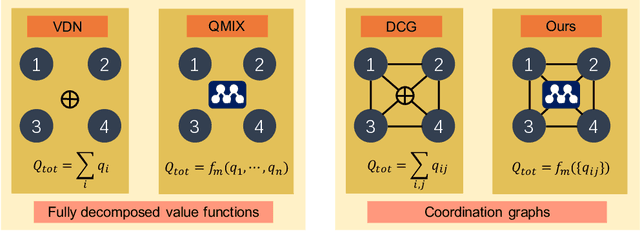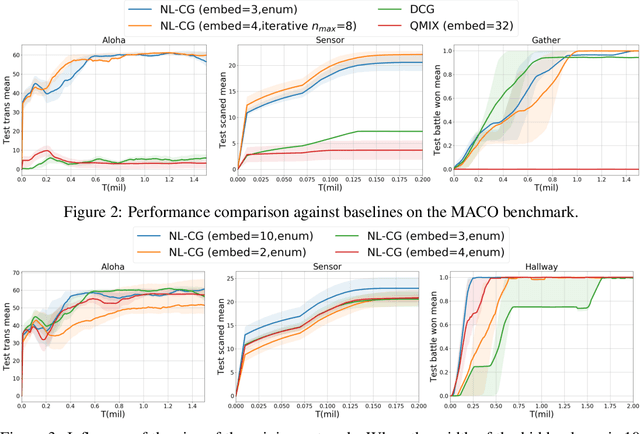Xiaoran Wu
Policy-to-Language: Train LLMs to Explain Decisions with Flow-Matching Generated Rewards
Feb 18, 2025Abstract:As humans increasingly share environments with diverse agents powered by RL, LLMs, and beyond, the ability to explain their policies in natural language will be vital for reliable coexistence. In this paper, we build a model-agnostic explanation generator based on an LLM. The technical novelty is that the rewards for training this LLM are generated by a generative flow matching model. This model has a specially designed structure with a hidden layer merged with an LLM to harness the linguistic cues of explanations into generating appropriate rewards. Experiments on both RL and LLM tasks demonstrate that our method can generate dense and effective rewards while saving on expensive human feedback; it thus enables effective explanations and even improves the accuracy of the decisions in original tasks.
Non-Linear Coordination Graphs
Oct 26, 2022



Abstract:Value decomposition multi-agent reinforcement learning methods learn the global value function as a mixing of each agent's individual utility functions. Coordination graphs (CGs) represent a higher-order decomposition by incorporating pairwise payoff functions and thus is supposed to have a more powerful representational capacity. However, CGs decompose the global value function linearly over local value functions, severely limiting the complexity of the value function class that can be represented. In this paper, we propose the first non-linear coordination graph by extending CG value decomposition beyond the linear case. One major challenge is to conduct greedy action selections in this new function class to which commonly adopted DCOP algorithms are no longer applicable. We study how to solve this problem when mixing networks with LeakyReLU activation are used. An enumeration method with a global optimality guarantee is proposed and motivates an efficient iterative optimization method with a local optimality guarantee. We find that our method can achieve superior performance on challenging multi-agent coordination tasks like MACO.
* Authors are listed in alphabetical order
Multi-Agent Policy Transfer via Task Relationship Modeling
Mar 09, 2022



Abstract:Team adaptation to new cooperative tasks is a hallmark of human intelligence, which has yet to be fully realized in learning agents. Previous work on multi-agent transfer learning accommodate teams of different sizes, heavily relying on the generalization ability of neural networks for adapting to unseen tasks. We believe that the relationship among tasks provides the key information for policy adaptation. In this paper, we try to discover and exploit common structures among tasks for more efficient transfer, and propose to learn effect-based task representations as a common space of tasks, using an alternatively fixed training scheme. We demonstrate that the task representation can capture the relationship among tasks, and can generalize to unseen tasks. As a result, the proposed method can help transfer learned cooperation knowledge to new tasks after training on a few source tasks. We also find that fine-tuning the transferred policies help solve tasks that are hard to learn from scratch.
 Add to Chrome
Add to Chrome Add to Firefox
Add to Firefox Add to Edge
Add to Edge